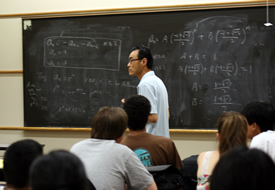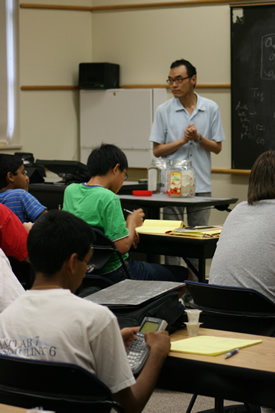
 |
| Professor of Mathematics Eddie Cheng serves as director of the Summer Math Institute. |
By Rebecca Wyatt Thomas, OU Web Writer
David Sherman, a senior at Birmingham Groves High School, has exhausted the mathematics classes he can take at the secondary education level. Math is something he enjoys and excels at. For the past three years, Sherman has participated in the Oakland University Summer Mathematics Institute. The program, which is funded by an anonymous donor, allows students to take college-level mathematics courses and earn college credit — for free.
“I want to learn. I have been interested in math for as long as I can remember,” Sherman said. “This is a place I can get math that isn’t the same type of stuff I’d be learning in high school.”
During the six-week program, students take two four-credit, college-level math classes and work on homework and problems in small groups with OU graduate students. They meet from 8:30 a.m. to 3:30 p.m., Monday through Thursday and 8:30 a.m. to 1 p.m. on Fridays.
This year the courses were in geometry and enumeration and were taught by Professor of Mathematics and Mathematics Summer Institute Director Eddie Cheng and OU Associate Professor of Mathematics László Lipták. Students also heard from Distinguished Colloquium Speaker Professor Herb Wilf, Thomas A. Scott Professor of Mathematics at the University of Pennsylvania.
 |
| Forty high school students gifted in mathematics are admitted into the program after demonstrating a higher-level mathematics ability. |
The experience, course materials and daily lunches are provided at no cost to the student thanks to the anonymous gift. It is one of the only programs that provides this type of experience to students for free.
Forty high school students gifted in mathematics are admitted into the program after demonstrating a higher-level mathematics ability. Some highly exceptional middle school students are also admitted to the program. Randy Jia, an incoming sophomore at Detroit Country Day, was one of those students. He is participating in the summer program for a second time.
“Math is fun. It comes really easily to me,” Jia said. “This program challenges me.”
According to Cheng, 40 to 50 percent of students who participate in the camp return in subsequent summers. The topics are on a four-year rotation to allow students to participate multiple times and still learn fresh material.
“The students like math, that’s why they are there,” Cheng said. “It also looks good on future college applications.”
One student is also selected to participate in a research project during the fall and winter semesters with Cheng.
Students from the program often go on to prestigious math programs. Sherman, who wants to major it math, hopes to get in at the University of Michigan or Cal Tech. He said the program is certainly useful in preparing for college because it gives him exposure to the college atmosphere.
“This is what I wanted to do during the summer,” Sherman said. “I have the math experience and good friends that I wouldn’t have known otherwise.”
For more information on the program, visit the Mathematics Summer Institute Web site.
 David Sherman, a senior at Birmingham Groves High School, has exhausted the mathematics classes he can take at the secondary education level. Math is something he enjoys and excels at. For the past three years, Sherman has participated in the Oakland University Summer Mathematics Institute. The program, which is funded by an anonymous donor, allows students to take college-level mathematics courses and earn college credit — for free.
David Sherman, a senior at Birmingham Groves High School, has exhausted the mathematics classes he can take at the secondary education level. Math is something he enjoys and excels at. For the past three years, Sherman has participated in the Oakland University Summer Mathematics Institute. The program, which is funded by an anonymous donor, allows students to take college-level mathematics courses and earn college credit — for free.